Lebanon president rejects global probe into port blast
WHAT'S HE HIDING?
Hashem Osseiran and Jean-Marc Mojon,
AFP•August 7, 2020
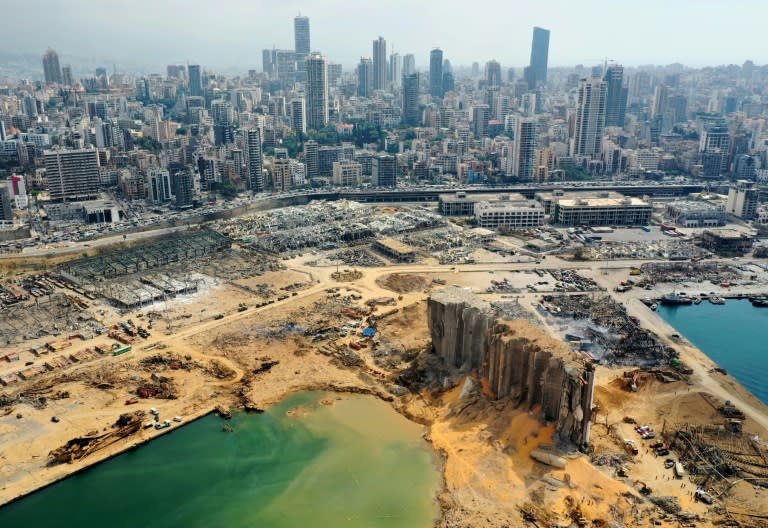
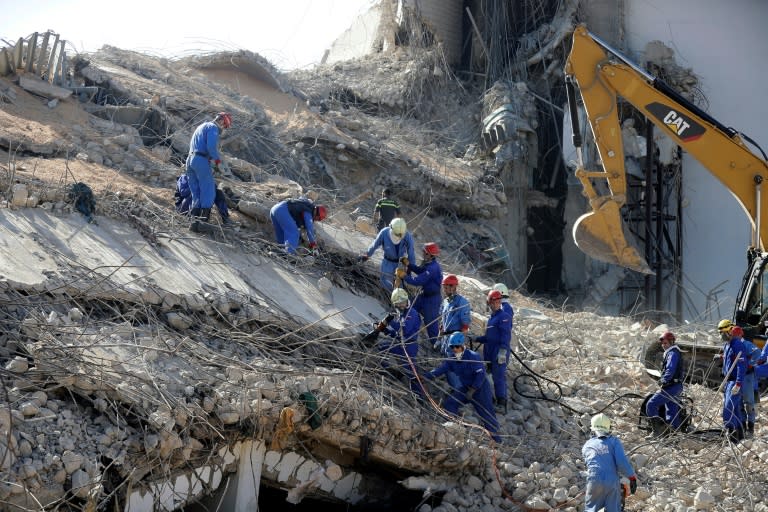
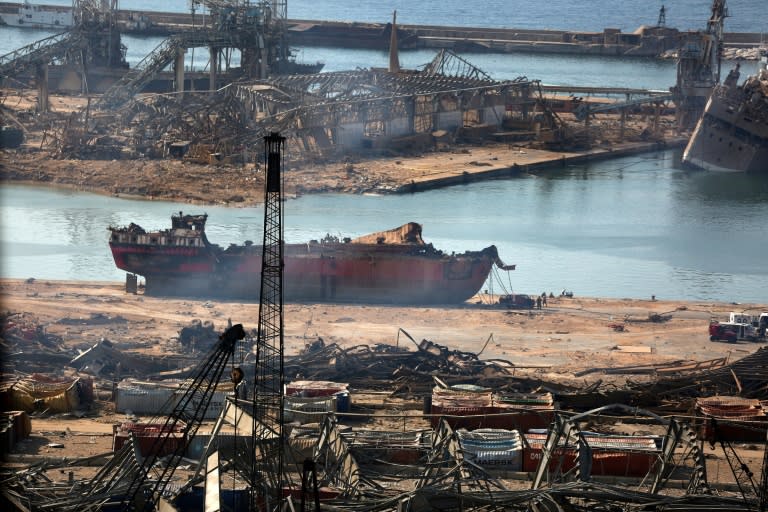
Lebanon president rejects global probe into port blast
Beirut's port has been reduced to an enormous scrapyard
Lebanon's president has rejected any international probe into the catastrophic Beirut port blast, saying a missile or negligence could have been responsible as rescuers desperately combed the rubble for survivors.
The entrenched ruling class has come under fire once again since Tuesday's explosion, which killed at least 154 people and devastated swathes of the capital.
The revelation that a huge shipment of hazardous ammonium nitrate had languished for years in a warehouse in the heart of the capital served as shocking proof to many Lebanese of the rot at the core of their political system.
Even Lebanese President Michel Aoun admitted Friday that the "paralysed" system needed to be "reconsidered".
He pledged "swift justice", but rejected widespread calls for an international probe, telling a reporter he saw it as an attempt to "dilute the truth".
"There are two possible scenarios for what happened: it was either negligence or foreign interference through a missile or bomb," he said, the first time a top Lebanese official raised the possibility that the port had been attacked.
What ignited the massive shipment of the chemical remains unclear -- officials have said work had recently begun on repairs to the warehouse, while others suspected fireworks stored either in the same place or nearby.
Near the site of the explosion, by the carcass of the port's giant grain silos, rescue teams from France, Russia, Germany, Italy and other countries coordinated their search efforts.
The World Food Programme has promised food for affected families and wheat imports to replace lost stocks from the silos, and US President Donald Trump said he would join other leaders in a conference call Sunday to discuss coordinating international aid.
Four bodies were uncovered near the port's control room Friday, where a significant number of people were expected to have been working at the time of the blast.
No one has been found alive.
"I am waiting to hear that you have been rescued alive, my dear," tweeted Emilie Hasrouty, whose brother is among the missing.
"I am paralysed with fear."
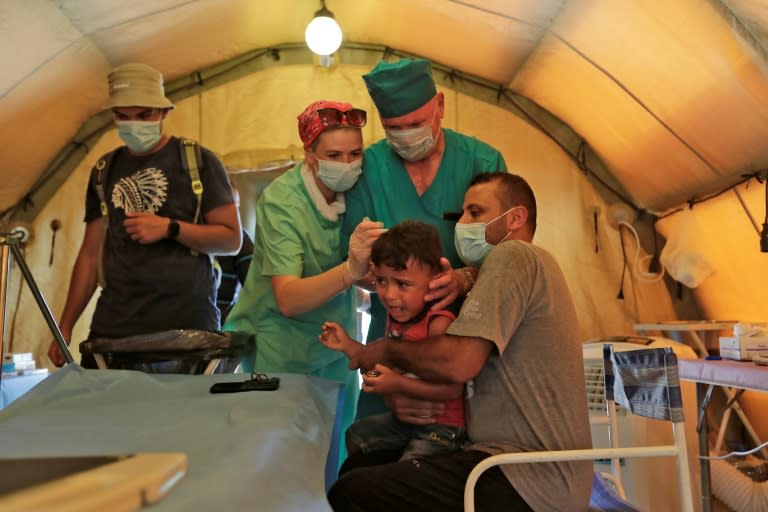
- 100,000 children homeless -
At the port, reduced to an enormous scrapyard, excavators removed mangled shipping containers to clear a path for rescuers.
Civil defence teams anxiously watched a sniffer dog pace around a gap under a fallen crane.
Beirut has received a stream of international assistance since the blast.
On Friday, relief flights from Iran, Saudi Arabia and the United Arab Emirates landed in Lebanon, following others from France, Kuwait, Qatar and Russia.
International police agency Interpol has said it will send a team of experts who are specialised in identifying victims.
The World Health Organization, meanwhile, called for $15 million to cover immediate health needs.
Lebanon's hospitals, already strained by rising coronavirus cases and a severe economic crisis, were heavily damaged by the blast and overwhelmed by casualties.
Two days after the explosion, Lebanese were flocking to a 20-tent Russian field hospital newly established in the capital's largest sports stadium.
The United Nations said up to 100,000 children are among the 300,000 people made homeless, including many who have been separated from their families.
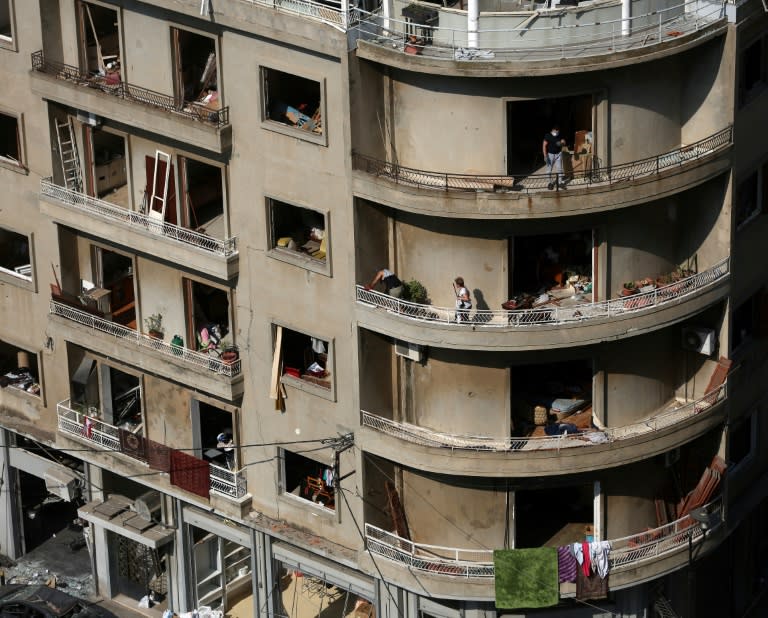
- 'We have nothing' -
With destruction from the blast engulfing half of the capital and estimated to cost more than $3 billion, world leaders, advocacy groups and Lebanese have demanded an international probe to ensure impartiality.
But Lebanon's powerful Hezbollah movement said Friday the army should lead such a probe because it was "trusted" by all.
Hezbollah chief Hassan Nasrallah denied accusations the Shiite party had been storing arms at the port, saying: "We have nothing in the port."
Lebanon's probe has so far led to 21 arrests, including the port's general manager Hassan Koraytem, other customs officials and port engineers, a judicial source told AFP.
Dozens more were being interrogated by Lebanon's military court, which is focusing on administrative and security officials at the port as well as government authorities who may have ignored warnings about explosive materials.
"The list of arrests will reach the top guys, who are now among the suspects," the source said.
Lebanon's central bank also ordered asset freezes for seven port and customs officials, an official and a banking source told AFP.
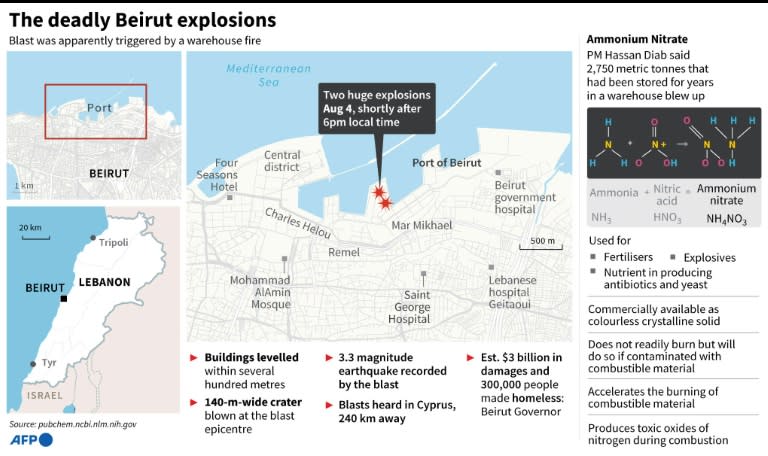
bur-ho/mjg-tgg/hkb/sw/rma/amj
The measures did not dampen the anger in Beirut's streets, where dozens of demonstrators scuffled with security forces firing tear gas late Thursday.And volunteers clearing debris have chased out two government ministers who tried to visit devastated neighbourhoods with furious chants of "resign".An anti-government protest is planned for Saturday afternoon under the slogan, "Hang them by the gallows".
As leaders in Lebanon deflect responsibility for explosion, skepticism grows
AbSewell,LA Times•August 7, 2020

French President Emmanuel Macron, left, and Lebanese President Michel Aoun meet Thursday. Macron visited Beirut to offer French support to Lebanon after the deadly port blast. (Thibault Camus / Pool Photo)
Following Tuesday’s deadly port explosion in Beirut, Lebanese officials face increasing ire from the public and a skeptical international community that has, nevertheless, promised to provide humanitarian aid to help the devastated city get back on its feet.
While both Lebanese citizens and foreign leaders have pushed for an overhaul in the governance of the small Mediterranean country that had already been in the throes of a major economic crisis before the explosion, Lebanese leaders appeared to be digging in their heels.
Beirut residents, who had already been protesting government corruption and inertia and failing public services since October, were enraged when it turned out that Tuesday’s blast had been caused by a stockpile of ammonium nitrate, a highly volatile chemical that had been sitting in a warehouse in the port since 2013 despite warnings of the potential dangers.
A protest in front of the Parliament building in downtown Beirut on Thursday night was met with tear gas. An announcement was posted online for another, likely larger, protest planned for Saturday afternoon, took a militant tone: “On August 4, 2020, the criminal authority dropped a bomb in central Beirut and declared that there are no limits to its criminality…On August 4, 2020, the authority declared war on us. As for us, we announce the beginning of the liberation battle.”
To date, while a number of port officials have been placed under house arrest over the explosion, no high-profile government figures have resigned or shown any inclination to do so.
In remarks Friday, President Michel Aoun rejected calls by some in Lebanon for an international investigation into the cause of the port explosion and also seemed to indicate that no immediate government shakeup would be forthcoming.
“What has been said about the resignation of the government and the formation of a national unity government requires preparing the appropriate atmosphere,” he said, “We cannot call for a unity government to reach later on to the division that we have witnessed in previous governments.”
Aoun also suggested that the explosion might have been triggered by an attack — contrary to the prevailing theory that had been previously put forth by officials — that an accidental fire at the port had spread to the warehouse holding the ammonium nitrate.
“There are two possibilities for what happened. Either it was a result of negligence or external interference by means of a missile or bomb,” he said, adding that he was seeking aerial photos of the site to see if there were planes or missiles in the air.
Also Friday, Hassan Nasrallah, leader of the militia and political party Hezbollah, appeared in a televised speech in which he denied accusations that Hezbollah had stored weapons at the port or had any oversight over port operations.
“We do not manage the port or control the port or run the port or intervene in the port, nor do we know what is present in the port,” he said. “… Hezbollah might know the port of Haifa better than the port of Beirut.”
While political leaders in Lebanon deflected responsibility, the international community whose help they desperately need remained wary.
French President Emmanuel Macron, who visited the site of the blast on Thursday, while promising aid, also chastised the Lebanese political class, saying, "A new political order must be reestablished and radical change is needed” in the country.
France, which formerly ruled Lebanon as a colonial power, has in more recent years frequently bailed the country out, both politically and monetarily. In 2018, Paris hosted the Cedre conference, which raised $11 billion in pledges of financing for infrastructure projects in Lebanon, but the Lebanese government, which never implemented the economic and governance reforms required to have the funding released, never got the money.
During Lebanon’s deepening economic crisis and currency crisis in recent months, donor countries had remained reluctant to offer a bailout unless Lebanon could first reach a deal with the IMF, from which it has requested $10 billion. And the United States, which regards the current government of Lebanon as Hezbollah-dominated and considers Hezbollah a terrorist group, has also been reluctant to offer support.
But after the disaster, Macron announced that he would organize an international donor conference, which will be held Sunday under the auspices of the European Commission, to bring in contributions for medicine, food and housing to address the most urgent needs in the wake of the disaster that left more than 150 dead, 5,000 injured and many more homeless.
Apart from the immediate emergency response needs, Beirut’s governor has estimated that the city suffered $3 billion in infrastructure damage.
Already a number of countries have pledged funds, including the U.S., which has offered $17 million and the European Union, which pledged 33 million euros. Others, including regional rivals Iran and Saudi Arabia, have sent plane loads of emergency supplies, including medicine, food, and shelter kits, or have dispatched medical teams.
Imad Salamey, an associate professor of political science and international affairs at the Lebanese American University and who has written a book on Lebanese political history, said the suffering caused by the explosion had given the Lebanese government an opening to “break the informal sanctions imposed on it by the international community.”
“The political establishment will try to leverage the situation to its own political gain,” he said.
However, Salamey said that Lebanon has less leverage than it might have in the past, when rival international players jockeying for power in the region might have aimed to gain influence by providing aid. Iraq and Syria are now the more geopolitically important sites in the region, he said, while Lebanon “does not anymore have the strategic role that it had in the past, so it is not likely that there will be an international competition to gain political advantages or a political role in the country.”
On the other hand, the fact that Lebanon is now increasingly desperate means that the international players that are willing to help may have more influence now, said Maha Yahya, director of the Carnegie Middle East Center. That could include pushing for the resignation for the current government headed by Prime Minister Hassan Diab and putting in place a transitional government to steer through the crisis.
Diab had already been on politically thin ice over the economic situation before the explosion. But Lebanese politics often tilts toward inertia because of its sectarian-based power-sharing system, which was set up after the civil war to preserve the peace but leads to frequent stalemates between the patchwork of competing factions.
Yahya said that while “it’s clear that even the political parties that initially backed it no longer want this government” it remains in place because “they can’t agree on who to replace it or what to replace it with.”
But now the disaster might force their hand, she said.
“We’re no longer talking about Lebanon falling into the abyss — it’s already there,” she said. “So, the only way it can make its way out is through international support, both political and financial… The way I see things going, I think if there is enough international pressure, this government may actually be forced to go.”
Sewell is a Times special correspondent.
Lebanon president: Beirut explosion either due to negligence or missile, bomb
Staff and wires,USA TODAY•August 7, 2020
Massive explosion in Beirut, cause unknown
Lebanese President Michel Aoun said Friday there are two possible causes of Tuesday’s explosion that killed nearly 150 people – either negligence or “external intervention” by a missile or bomb.
He also rejected the United Nations human rights commission call for an international investigation.
It's believed that the blast occurred when a fire ignited 2,750 tons of ammonium nitrate stored at the port. The cause of the initial fire is unknown.
Aoun said Friday that he asked France for satellite images to see if there were warplanes or missiles in the air at the time of the blast. This differs from the main narrative of recent days, which focused on investigating Lebanese port and customs officials for negligence.
Also Friday, Lebanon’s state news agency said investigative Judge Ghassan Khoury placed chief of the customs department Badri Daher under arrest. Daher said he warned officials about the ammonium nitrate numerous times over the years.
IN-DEPTH: Before and after images of the Beirut blast site
Aoun told journalists that he received information weeks ago about the dangerous material and “immediately ordered” military and security officials to take care of it. Aoun’s comments were the most senior confirmation that top politicians had been aware of the stockpile.
“The material had been there for seven years, since 2013. It has been there, and they said it is dangerous, and I am not responsible," said Aoun, who took office in 2016.

Following Tuesday’s deadly port explosion in Beirut, Lebanese officials face increasing ire from the public and a skeptical international community that has, nevertheless, promised to provide humanitarian aid to help the devastated city get back on its feet.
While both Lebanese citizens and foreign leaders have pushed for an overhaul in the governance of the small Mediterranean country that had already been in the throes of a major economic crisis before the explosion, Lebanese leaders appeared to be digging in their heels.
Beirut residents, who had already been protesting government corruption and inertia and failing public services since October, were enraged when it turned out that Tuesday’s blast had been caused by a stockpile of ammonium nitrate, a highly volatile chemical that had been sitting in a warehouse in the port since 2013 despite warnings of the potential dangers.
A protest in front of the Parliament building in downtown Beirut on Thursday night was met with tear gas. An announcement was posted online for another, likely larger, protest planned for Saturday afternoon, took a militant tone: “On August 4, 2020, the criminal authority dropped a bomb in central Beirut and declared that there are no limits to its criminality…On August 4, 2020, the authority declared war on us. As for us, we announce the beginning of the liberation battle.”
To date, while a number of port officials have been placed under house arrest over the explosion, no high-profile government figures have resigned or shown any inclination to do so.
In remarks Friday, President Michel Aoun rejected calls by some in Lebanon for an international investigation into the cause of the port explosion and also seemed to indicate that no immediate government shakeup would be forthcoming.
“What has been said about the resignation of the government and the formation of a national unity government requires preparing the appropriate atmosphere,” he said, “We cannot call for a unity government to reach later on to the division that we have witnessed in previous governments.”
Aoun also suggested that the explosion might have been triggered by an attack — contrary to the prevailing theory that had been previously put forth by officials — that an accidental fire at the port had spread to the warehouse holding the ammonium nitrate.
“There are two possibilities for what happened. Either it was a result of negligence or external interference by means of a missile or bomb,” he said, adding that he was seeking aerial photos of the site to see if there were planes or missiles in the air.
Also Friday, Hassan Nasrallah, leader of the militia and political party Hezbollah, appeared in a televised speech in which he denied accusations that Hezbollah had stored weapons at the port or had any oversight over port operations.
“We do not manage the port or control the port or run the port or intervene in the port, nor do we know what is present in the port,” he said. “… Hezbollah might know the port of Haifa better than the port of Beirut.”
While political leaders in Lebanon deflected responsibility, the international community whose help they desperately need remained wary.
French President Emmanuel Macron, who visited the site of the blast on Thursday, while promising aid, also chastised the Lebanese political class, saying, "A new political order must be reestablished and radical change is needed” in the country.
France, which formerly ruled Lebanon as a colonial power, has in more recent years frequently bailed the country out, both politically and monetarily. In 2018, Paris hosted the Cedre conference, which raised $11 billion in pledges of financing for infrastructure projects in Lebanon, but the Lebanese government, which never implemented the economic and governance reforms required to have the funding released, never got the money.
During Lebanon’s deepening economic crisis and currency crisis in recent months, donor countries had remained reluctant to offer a bailout unless Lebanon could first reach a deal with the IMF, from which it has requested $10 billion. And the United States, which regards the current government of Lebanon as Hezbollah-dominated and considers Hezbollah a terrorist group, has also been reluctant to offer support.
But after the disaster, Macron announced that he would organize an international donor conference, which will be held Sunday under the auspices of the European Commission, to bring in contributions for medicine, food and housing to address the most urgent needs in the wake of the disaster that left more than 150 dead, 5,000 injured and many more homeless.
Apart from the immediate emergency response needs, Beirut’s governor has estimated that the city suffered $3 billion in infrastructure damage.
Already a number of countries have pledged funds, including the U.S., which has offered $17 million and the European Union, which pledged 33 million euros. Others, including regional rivals Iran and Saudi Arabia, have sent plane loads of emergency supplies, including medicine, food, and shelter kits, or have dispatched medical teams.
Imad Salamey, an associate professor of political science and international affairs at the Lebanese American University and who has written a book on Lebanese political history, said the suffering caused by the explosion had given the Lebanese government an opening to “break the informal sanctions imposed on it by the international community.”
“The political establishment will try to leverage the situation to its own political gain,” he said.
However, Salamey said that Lebanon has less leverage than it might have in the past, when rival international players jockeying for power in the region might have aimed to gain influence by providing aid. Iraq and Syria are now the more geopolitically important sites in the region, he said, while Lebanon “does not anymore have the strategic role that it had in the past, so it is not likely that there will be an international competition to gain political advantages or a political role in the country.”
On the other hand, the fact that Lebanon is now increasingly desperate means that the international players that are willing to help may have more influence now, said Maha Yahya, director of the Carnegie Middle East Center. That could include pushing for the resignation for the current government headed by Prime Minister Hassan Diab and putting in place a transitional government to steer through the crisis.
Diab had already been on politically thin ice over the economic situation before the explosion. But Lebanese politics often tilts toward inertia because of its sectarian-based power-sharing system, which was set up after the civil war to preserve the peace but leads to frequent stalemates between the patchwork of competing factions.
Yahya said that while “it’s clear that even the political parties that initially backed it no longer want this government” it remains in place because “they can’t agree on who to replace it or what to replace it with.”
But now the disaster might force their hand, she said.
“We’re no longer talking about Lebanon falling into the abyss — it’s already there,” she said. “So, the only way it can make its way out is through international support, both political and financial… The way I see things going, I think if there is enough international pressure, this government may actually be forced to go.”
Sewell is a Times special correspondent.
Lebanon president: Beirut explosion either due to negligence or missile, bomb
Staff and wires,USA TODAY•August 7, 2020
Massive explosion in Beirut, cause unknown
Lebanese President Michel Aoun said Friday there are two possible causes of Tuesday’s explosion that killed nearly 150 people – either negligence or “external intervention” by a missile or bomb.
He also rejected the United Nations human rights commission call for an international investigation.
It's believed that the blast occurred when a fire ignited 2,750 tons of ammonium nitrate stored at the port. The cause of the initial fire is unknown.
Aoun said Friday that he asked France for satellite images to see if there were warplanes or missiles in the air at the time of the blast. This differs from the main narrative of recent days, which focused on investigating Lebanese port and customs officials for negligence.
Also Friday, Lebanon’s state news agency said investigative Judge Ghassan Khoury placed chief of the customs department Badri Daher under arrest. Daher said he warned officials about the ammonium nitrate numerous times over the years.
IN-DEPTH: Before and after images of the Beirut blast site
Aoun told journalists that he received information weeks ago about the dangerous material and “immediately ordered” military and security officials to take care of it. Aoun’s comments were the most senior confirmation that top politicians had been aware of the stockpile.
“The material had been there for seven years, since 2013. It has been there, and they said it is dangerous, and I am not responsible," said Aoun, who took office in 2016.

In this Thursday, June 25, 2009, file photo, Lebanese Christian leader lawmaker Michel Aoun gestures as he arrives at the Parliament for the election of the house speaker in Beirut, Lebanon
At least 10 times over the past six years, authorities from Lebanon’s customs, military, security agencies and judiciary raised alarm that a massive stockpile of explosive chemicals was being kept with almost no safeguard at the port in the heart of Beirut, newly surfaced documents show, according to the Associated Press.
'A titanic job'
Aoun said the Lebanese government's investigation into the cause of the explosion is concentrating on 20 people. Port officials have been put under house arrest.
Misinformation on social media blamed Israel, but Israeli officials have denied any involvement and have offered aid to Lebanon.

At least 10 times over the past six years, authorities from Lebanon’s customs, military, security agencies and judiciary raised alarm that a massive stockpile of explosive chemicals was being kept with almost no safeguard at the port in the heart of Beirut, newly surfaced documents show, according to the Associated Press.
'A titanic job'
Aoun said the Lebanese government's investigation into the cause of the explosion is concentrating on 20 people. Port officials have been put under house arrest.
Misinformation on social media blamed Israel, but Israeli officials have denied any involvement and have offered aid to Lebanon.

A man sits between debris inside his house damaged by Tuesday's explosion in the seaport of Beirut, Lebanon, on Aug. 7, 2020. The U.N. human rights office is calling for an independent investigation into the deadly explosion, insisting "victims' calls for accountability must be heard."More
France’s No. 2 forensic police official, Dominique Abbenanti, said Friday the explosion “appears to be an accident” but that it’s too early to know. France, which has close ties to its former colony, sent 22 investigators.
French police could question witnesses or suspects, said Eric Berot, chief of a unit involved in the investigation. For now, the French team is dividing up zones to cover with their Lebanese counterparts and will use drones to study the area.
“The zone is enormous. It’s a titanic job,” Berot said. The investigation is complicated by “the Lebanese situation,” he said, referring to the political and economic crisis.
Earlier this week, President Donald Trump called it a "terrible attack" based on the suspicions of U.S. generals he did not name. However, Defense Secretary Mark Esper later said it was likely an accident.
Ammonium nitrate
Tuesday's explosion had the force of at least 500 tons of TNT, according to a U.S. government source, who was not authorized to speak publicly. The estimate was based on the widespread destruction, said the source, who has experience with military explosives.
REPORTER IN BEIRUT: Forced to bury a dog that made 'dystopia more bearable'
The blast caused carnage over a 6-mile radius and was felt more than 100 miles away.

France’s No. 2 forensic police official, Dominique Abbenanti, said Friday the explosion “appears to be an accident” but that it’s too early to know. France, which has close ties to its former colony, sent 22 investigators.
French police could question witnesses or suspects, said Eric Berot, chief of a unit involved in the investigation. For now, the French team is dividing up zones to cover with their Lebanese counterparts and will use drones to study the area.
“The zone is enormous. It’s a titanic job,” Berot said. The investigation is complicated by “the Lebanese situation,” he said, referring to the political and economic crisis.
Earlier this week, President Donald Trump called it a "terrible attack" based on the suspicions of U.S. generals he did not name. However, Defense Secretary Mark Esper later said it was likely an accident.
Ammonium nitrate
Tuesday's explosion had the force of at least 500 tons of TNT, according to a U.S. government source, who was not authorized to speak publicly. The estimate was based on the widespread destruction, said the source, who has experience with military explosives.
REPORTER IN BEIRUT: Forced to bury a dog that made 'dystopia more bearable'
The blast caused carnage over a 6-mile radius and was felt more than 100 miles away.

A drone photograph on Aug. 5, 2020 shows the scene of an explosion that hit the seaport of Beirut, Lebanon. A massive explosion rocked Beirut on Tuesday, flattening much of the city's port, damaging buildings across the capital and sending a giant mushroom cloud into the sky.More
Ammonium nitrate has been linked to past industrial accidents, including explosions at a fertilizer plant in Texas in 2013, a Chinese port in 2015 and many others.
COULD IT HAPPEN HERE? US ports safer but not immune to disaster
It was also used in the Oklahoma City bombing in 1995, when a truck bomb containing 2.4 tons of fertilizer and fuel oil killed 168 people in a federal building. It's a common fertilizer that's highly explosive.
Storage is critical. Left unchecked, ammonium nitrate can be contaminated by industrial elements such as fuel oil. The chemical can also decompose on its own, generating heat.
An explosion of ammonium nitrate releases gases, including nitrogen dioxide, which is orange or reddish in color.
Beirut disaster videos show a gray cloud rising from the port, in what appears to be a large industrial fire. A building explodes, creating an orange-reddish cloud, followed closely by a white mushroom cloud as a shock wave hits.
Rescue and recovery

Ammonium nitrate has been linked to past industrial accidents, including explosions at a fertilizer plant in Texas in 2013, a Chinese port in 2015 and many others.
COULD IT HAPPEN HERE? US ports safer but not immune to disaster
It was also used in the Oklahoma City bombing in 1995, when a truck bomb containing 2.4 tons of fertilizer and fuel oil killed 168 people in a federal building. It's a common fertilizer that's highly explosive.
Storage is critical. Left unchecked, ammonium nitrate can be contaminated by industrial elements such as fuel oil. The chemical can also decompose on its own, generating heat.
An explosion of ammonium nitrate releases gases, including nitrogen dioxide, which is orange or reddish in color.
Beirut disaster videos show a gray cloud rising from the port, in what appears to be a large industrial fire. A building explodes, creating an orange-reddish cloud, followed closely by a white mushroom cloud as a shock wave hits.
Rescue and recovery

Relatives of Lebanese army lieutenant Ayman Noureddine, who was killed by Tuesday's explosion that hit the seaport of Beirut, mourn over his coffin during his funeral procession, in Numeiriyeh village, south Lebanon, Friday, Aug. 7, 2020. Rescue teams were still searching the rubble of Beirut's port for bodies on Friday, nearly three days after a massive explosion sent a wave of destruction through Lebanon's capital.More
The government estimated 300,000 people – more than 12% of Beirut’s population – had to leave homes damaged by the blast. Many have since returned or are staying with loved ones. Officials estimate the explosion caused $10 billion to $15 billion in losses.
On Friday, rescuers continued pulling bodies from the wreckage.
“Our experience shows that we can find people alive until up to 72, 75 or 80 hours after an explosion or an earthquake, so for now we are still in time and we cling on to this hope,” said Col. Vincent Tissier, head of the French rescue team.
Non-governmental organizations in Lebanon before the explosion were already struggling to provide the aid needed to the country. HOPE worldwide is one of those organizations that has been providing assistance to the country since last October.
In addition to providing and distributing food, the HOPE worldwide's Lebanon branch is preparing to renovate and rebuild homes that suffered damaged from the explosion.
"This is as much as we can (do) as an NGO," Mofid Tohme, the president of HOPE Worldwide's Lebanese branch, said.
Thousands of Lebanese citizens filled the streets in the days after the blast, bringing their own brooms, shovels and other materials to help clean up the streets of Beirut, according to Lebanese activist Ralph Baydou.
"This is what also what is keeping the state alive," Baydou said. "Us, the Lebanese citizens stepping in instead of the State."
Contributing: Dennis Wagner, Sarah Elbeshbishi, Anne Godlasky, USA TODAY; The Associated Press
This article originally appeared on USA TODAY: Beirut explosion due to negligence or missile, says Lebanon president
The government estimated 300,000 people – more than 12% of Beirut’s population – had to leave homes damaged by the blast. Many have since returned or are staying with loved ones. Officials estimate the explosion caused $10 billion to $15 billion in losses.
On Friday, rescuers continued pulling bodies from the wreckage.
“Our experience shows that we can find people alive until up to 72, 75 or 80 hours after an explosion or an earthquake, so for now we are still in time and we cling on to this hope,” said Col. Vincent Tissier, head of the French rescue team.
Non-governmental organizations in Lebanon before the explosion were already struggling to provide the aid needed to the country. HOPE worldwide is one of those organizations that has been providing assistance to the country since last October.
In addition to providing and distributing food, the HOPE worldwide's Lebanon branch is preparing to renovate and rebuild homes that suffered damaged from the explosion.
"This is as much as we can (do) as an NGO," Mofid Tohme, the president of HOPE Worldwide's Lebanese branch, said.
Thousands of Lebanese citizens filled the streets in the days after the blast, bringing their own brooms, shovels and other materials to help clean up the streets of Beirut, according to Lebanese activist Ralph Baydou.
"This is what also what is keeping the state alive," Baydou said. "Us, the Lebanese citizens stepping in instead of the State."
Contributing: Dennis Wagner, Sarah Elbeshbishi, Anne Godlasky, USA TODAY; The Associated Press
This article originally appeared on USA TODAY: Beirut explosion due to negligence or missile, says Lebanon president
No comments:
Post a Comment